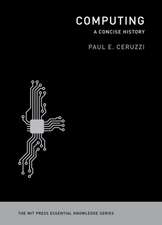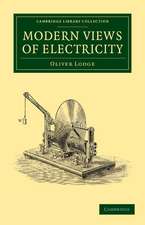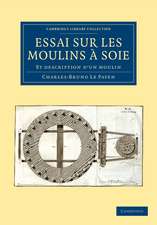Technology and Transformation in the American Electric Utility Industry
Autor Richard F. Hirshen Limba Engleză Paperback – 19 noi 2003
| Toate formatele și edițiile | Preț | Express |
|---|---|---|
| Paperback (1) | 331.57 lei 6-8 săpt. | |
| Cambridge University Press – 19 noi 2003 | 331.57 lei 6-8 săpt. | |
| Hardback (1) | 693.36 lei 6-8 săpt. | |
| Cambridge University Press – 23 noi 1989 | 693.36 lei 6-8 săpt. |
Preț: 331.57 lei
Nou
Puncte Express: 497
Preț estimativ în valută:
63.45€ • 66.00$ • 52.38£
63.45€ • 66.00$ • 52.38£
Carte tipărită la comandă
Livrare economică 12-26 aprilie
Preluare comenzi: 021 569.72.76
Specificații
ISBN-13: 9780521524711
ISBN-10: 0521524717
Pagini: 292
Ilustrații: black & white illustrations
Dimensiuni: 151 x 229 x 19 mm
Greutate: 0.45 kg
Ediția:Revised
Editura: Cambridge University Press
Colecția Cambridge University Press
Locul publicării:New York, United States
ISBN-10: 0521524717
Pagini: 292
Ilustrații: black & white illustrations
Dimensiuni: 151 x 229 x 19 mm
Greutate: 0.45 kg
Ediția:Revised
Editura: Cambridge University Press
Colecția Cambridge University Press
Locul publicării:New York, United States
Cuprins
Preface; Acknowledgment of financial support; Introduction; Part I. Progress and Culture: 1. Managerial and technological foundations; 2. Establishment of a management culture; 3. Manufacturers and technological progress before World War II; 4. Postwar strategies of utilities and manufacturers; 5. Utilities' role in technological progress; 6. The mid-1960s: at the pinnacle of success; Part II. Stasis: 7. Technical limits to progress in the 1960s and 1970s; 8. Design deficiencies and faulty technology; 9. Maelstroms and management malaise; 10. Criticisms of utility research and development; 11. The mid-1970s: near the bottom; Part III. Accommodating Stasis: 12. Understanding values: the basis for a new consensus; 13. The search for new technology; Part IV. Conclusion: 14. History and the management of technology; Appendices; Bibliographic note; Notes; Index.
Recenzii
"Hirsh's well-documented argument about 'technological stasis' commands the attention of all concerned with what has gone wrong with America's power industry. Beyond this, his blend of managerial, technological, economic, and cultural analysis takes us to a new plateau of understanding." Thomas K. McCraw, Harvard Business School
"This book, with its cross-disciplinary theme of 'technological stasis,' offers an innovative and compelling explanation of the extraordinary problems that have befallen America's electric utilities. Regulators, utility managers, activist citizens, and historians will find an important analysis, as well as a good story." Richard H.K. Vietor, Harvard Business School
"...provides excellent documentation on problems associated with managing technology in a vital industry." S. Shapiro, University of New Haven, in Choice
"This book, with its cross-disciplinary theme of 'technological stasis,' offers an innovative and compelling explanation of the extraordinary problems that have befallen America's electric utilities. Regulators, utility managers, activist citizens, and historians will find an important analysis, as well as a good story." Richard H.K. Vietor, Harvard Business School
"...provides excellent documentation on problems associated with managing technology in a vital industry." S. Shapiro, University of New Haven, in Choice
Descriere
This book examines management failures in America's electric utility industry in the 1960s and 1970s.
























